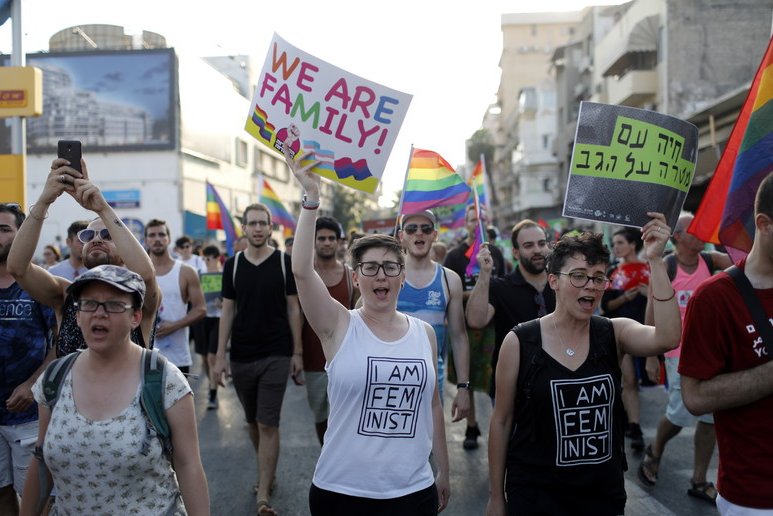Six months after a Supreme Court decision, Israel has opened surrogacy to every citizen — including same-sex couples, single men and transgender people.

Israel's LGBTQ community had demanded for years to be allowed to pursue surrogacy
Israeli same-sex couples can now become parents through surrogacy in Israel starting next week, the country's health minister announced Tuesday.
The decision upholds a Supreme Court ruling from last year that called for an end to the ban.
"It is a historic day for the LGBTQ struggle in Israel," said Health Minister Nitzan Horowitz, who is openly gay. "[This will] fulfil the dream of many to start a family,"
"Full equality. That is the simple demand and it is the goal of the LGBTQ struggle, the long struggle of my community" he said. "Equality before the law and equality of parenthood."
The ministry had issued a circular granting equal access for all to surrogate pregnancy, including single men and transgender people, Horowitz said.
TEL AVIV PRIDE BRINGS HUNDREDS OF THOUSANDS TO THE STREETS
Hundreds of thousands strong
Around 250,000 people took part in Tel Aviv's pride parade on Friday, making it far and away the biggest LGBT+ event in the Middle East. Participants wound their way through downtown Tel Aviv to the beachfront to see 2018 Eurovision Song Contest winner Netta Barzilai perform.
123456
Surrogacy law in Israel
Until the announcement, surrogacy in Israel was only accessible to heterosexual couples and single women.
The law did now allow same-sex couples to engage a surrogate in the country, forcing them to look for the costlier alternative of finding one abroad.
The country's LGBTQ community had long called for a change in this law and finally scored a victory last year.

Israeli Health Ministry had issued a circular granting equal access for all to surrogate pregnancy
In July, the country's Supreme Court annulled parts of a surrogacy law that prevented gay couples from having children through a surrogate in the Jewish state.
The state had argued that the law was intended to protect surrogate mothers.
The court, however, ruled that a balance could be struck without discriminating against same-sex couples. It added that the change in the law would come into effect after six months, allowing time for the formation of professional guidelines.
Israel is quite tolerant toward the LGBTQ community, in contrast with the rest of the Middle East.
While gays can openly serve in the country's military and parliament, they still face some obstacles, including the right to marriage.
DW/adi/rt (AP, Reuters)
Israel opens surrogacy to same-sex couples, single fathers, transgender people
By Simon Druker

Activists attend a demonstration for LGBT rights in Tel Aviv, Israel. The country's health ministry said Tuesday that same-sex couples can pursue parental surrogacy.
File Photo by Abir Sultan/EPA-EFE
Jan. 4 (UPI) -- Israel announced on Tuesday that the country will begin allowing same-sex couples, single fathers and transgender individuals to pursue parental surrogacy.
The news was delivered by Israeli health minister Nitzan Horowitz, who said the rules will take effect on Jan. 11.
The health ministry said the new rules will allow equal access to surrogacy across Israel.
Parenting children through surrogacy had previously been banned for same-sex couples, single men and transgender people in Israel.
Israel's highest court ruled last February that the ban was unconstitutional and current laws stipulate that surrogacy for parenthood is open only to heterosexual married couples or single women who have a genetic connection to the baby.
"The sweeping exclusion of homosexual men from the use of surrogacy is viewed as 'suspicious' discrimination, suggesting that this part of the population is inferior," Supreme Court President Esther Hayut and Justices Hanan Melcer and Neal Hendel wrote at the time.
"This is a historic day for the struggle of the LGBT community in Israel and for Israeli society as a whole. We are putting an end to years of injustice and discrimination -- the surrogacy equality revolution is underway," Horowitz told The Jerusalem Post.
Horowitz is the second openly-gay member of the Knesset, Israel's legislative body. In an interview with the Times of Israel, he called the topic a "personal struggle."
The first legal challenge to Israeli surrogacy laws was filed in 2011 by a same-sex couple and has dragged on for more than a decade.
Jan. 4 (UPI) -- Israel announced on Tuesday that the country will begin allowing same-sex couples, single fathers and transgender individuals to pursue parental surrogacy.
The news was delivered by Israeli health minister Nitzan Horowitz, who said the rules will take effect on Jan. 11.
The health ministry said the new rules will allow equal access to surrogacy across Israel.
Parenting children through surrogacy had previously been banned for same-sex couples, single men and transgender people in Israel.
Israel's highest court ruled last February that the ban was unconstitutional and current laws stipulate that surrogacy for parenthood is open only to heterosexual married couples or single women who have a genetic connection to the baby.
"The sweeping exclusion of homosexual men from the use of surrogacy is viewed as 'suspicious' discrimination, suggesting that this part of the population is inferior," Supreme Court President Esther Hayut and Justices Hanan Melcer and Neal Hendel wrote at the time.
"This is a historic day for the struggle of the LGBT community in Israel and for Israeli society as a whole. We are putting an end to years of injustice and discrimination -- the surrogacy equality revolution is underway," Horowitz told The Jerusalem Post.
Horowitz is the second openly-gay member of the Knesset, Israel's legislative body. In an interview with the Times of Israel, he called the topic a "personal struggle."
The first legal challenge to Israeli surrogacy laws was filed in 2011 by a same-sex couple and has dragged on for more than a decade.

No comments:
Post a Comment